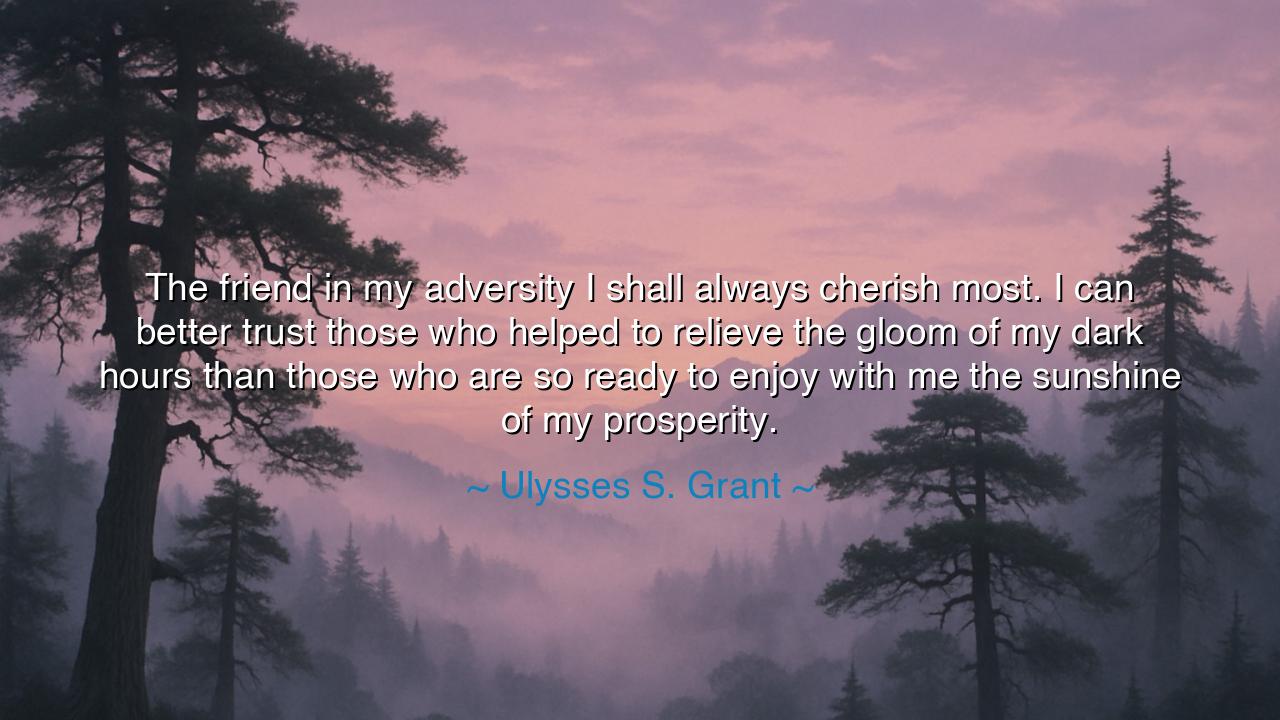
The friend in my adversity I shall always cherish most. I can
The friend in my adversity I shall always cherish most. I can better trust those who helped to relieve the gloom of my dark hours than those who are so ready to enjoy with me the sunshine of my prosperity.






Ulysses S. Grant, the steadfast general who carried a nation through its greatest trial, once said with the solemn wisdom of one who had known both glory and despair: “The friend in my adversity I shall always cherish most. I can better trust those who helped to relieve the gloom of my dark hours than those who are so ready to enjoy with me the sunshine of my prosperity.” These words rise not from comfort or ease, but from the furnace of experience — for Grant, who led men through war and suffered the loneliness of defeat before tasting victory, had learned that true friendship reveals itself not in celebration, but in sorrow. The companions who stand beside us when the world has turned its back are the ones whose loyalty is not gilded by fortune, but tested by fire.
The origin of this quote reflects the hard-earned lessons of Grant’s life. Before he became a hero of the Union, he was a man acquainted with failure. He had resigned from the army in obscurity, struggled in poverty, and endured humiliation before destiny called him back to service. In those years of adversity, when doors closed and hope dimmed, few offered him comfort — but those few, he never forgot. When prosperity finally returned to him through his victories in war and his rise to the presidency, he looked upon the crowds who praised him with the cautious eye of one who remembered loneliness. He knew that many who rejoice in your sunshine are absent in your storms. And so, he spoke these words not merely as reflection, but as warning: that a man must measure friendship not by presence in triumph, but by steadfastness in trouble.
In this truth lies a law of the human spirit as old as time: adversity reveals the heart. When life smiles upon us, many will gather to share its warmth; but when darkness descends, the fair-weather friend drifts away, while the true one draws near. This is why Grant vows to cherish those who “helped to relieve the gloom” — for such friends are rare, and their faithfulness priceless. Their loyalty is not borrowed from circumstance; it is born of love, courage, and compassion. They do not come to take, but to give — to offer presence when others flee, to speak words of light when all else is shadow.
Consider the example of Abraham Lincoln and his friendship with Grant himself. When critics rose against the general, accusing him of failure and calling for his dismissal, Lincoln stood firm. “I cannot spare this man,” he said, “he fights.” In those words lay trust — not the trust of politics, but of understanding. When others abandoned Grant, Lincoln’s confidence remained. And after Lincoln’s death, Grant carried his friend’s vision through to completion, preserving the Union they both served. Their bond, born in adversity, proved stronger than the alliances built in comfort or convenience. It was forged in shared struggle — and thus, it endured.
Grant’s wisdom calls us to examine our own hearts and companions. Who are those who seek our company only when life is easy? Who are those who sit with us when all joy has fled? The former are companions of the day — fleeting, bright, and shallow. The latter are the keepers of the night — steadfast, humble, and true. It is easy to join in laughter; it is harder to offer a hand in grief. The one who does so proves themselves worthy of trust. Such a friend is a sanctuary, a refuge of loyalty amid the world’s shifting sands.
Yet, Grant’s teaching is not merely about recognizing true friends — it is also about becoming one. To cherish those who helped us in hardship is noble; to be such a helper ourselves is divine. When we see another lost in darkness, let us not turn away in silence, but step forward with compassion. A word of encouragement, a quiet presence, a small act of generosity — these are the lamps that light the corridors of another’s despair. In doing so, we not only lift them, but refine our own souls. For the truest measure of a person is not how they celebrate with the joyful, but how they comfort the broken.
So, my children of reflection and heart, take this lesson of Ulysses S. Grant as your own: cherish the friend who stood beside you when the world did not. Trust those who came to your aid not in triumph, but in trial. Be wary of those who only rejoice in your good fortune, for many will share the feast, but few will walk the famine. Remember that friendship is not proven in sunshine, but in shadow — not in the heights of praise, but in the depths of pain.
And above all, strive to be that friend yourself — the one who enters when others depart, who stays when others forget, who shines even when there is no light to borrow. For when your own hour of darkness comes, it is not the echo of applause that will sustain you, but the quiet hand of the friend who never left your side. And when you find such a soul, hold them close, as Grant did, for they are the treasure of life itself — the light that endures when all other flames have gone out.






AAdministratorAdministrator
Welcome, honored guests. Please leave a comment, we will respond soon